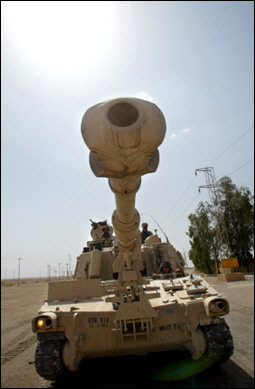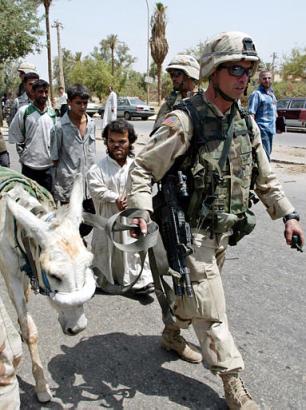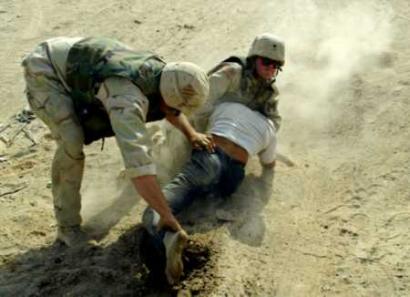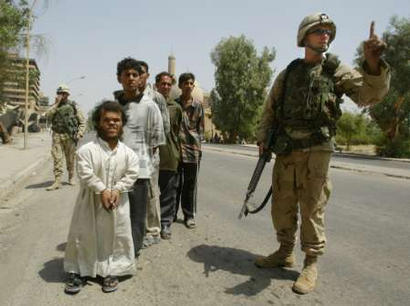A Soldiers News Blog
Thursday, June 12, 2003
Tuesday, June 10, 2003
Monday, June 09, 2003
NYTimes.com Article: G.I. and Cleric Vie for Hearts and Minds in Baghdad
This article from NYTimes.com
has been sent to you by spliffslips@aol.com.
Life for a US Soldier in Iraq
spliffslips@aol.com
/-------------------- advertisement -----------------------
Explore more of Starbucks at Starbucks.com.
http://www.starbucks.com/default.asp?ci=1015
\----------------------------------------------------------/
G.I. and Cleric Vie for Hearts and Minds in Baghdad
June 8, 2003
By DAVID ROHDE
BAGHDAD, Iraq, June 7 - Lt. Col. David Haight returned to
his base in southern Baghdad Monday morning exuding
satisfaction.
At 2:30 a.m., he and a group of paratroopers from the 82nd
Airborne Division had arrested Sheik Jassim al-Saadi, a
young Islamic cleric who, intelligence sources said, was a
threat. The charismatic cleric is one of hundreds of young
religious leaders in Iraq who have asserted their authority
in the power vacuum created by Saddam Hussein's fall.
Colonel Haight described how the cleric had confessed that
he had been instructing his followers to attack American
soldiers if the Americans did not keep their promises in
Iraq. So on Monday morning, the colonel, an intense and
introspective 41-year-old officer from Fairfax, Va.,
relished a small victory in his struggle to stabilize Abu
Disheer, a rough-edged working-class neighborhood in
southern Baghdad.
"Hopefully, he'll realize it's not worth it in this
neighborhood," he said.
A day after they arrested him, American forces released the
35-year-old cleric. His case had quickly taken on a life of
its own.
Moderate Iraqis who feared violence would request his
release, a street protest would be held, and Arabic news
media would portray his arrest as the unpopular act of
American occupiers.
After his release, the astute but soft-spoken young cleric
sat in his living room welcoming well-wishers and enjoying
sudden fame.
He denied threatening Americans or confessing, and he said
American fears of Iraq's religious leader were overblown.
But he warned that if Americans continued to treat them as
enemies, that was what they could become.
"I just understood one thing," he said. "There is a lack of
trust."
While policy makers and analysts in Washington discuss
curbing the spread of militant Islam in the abstract, a
political struggle between the American military and
hard-line Iraqi religious leaders is steadily intensifying
in Iraq.
Across the country, young American military officers are
competing with young, politically savvy Shiite and Sunni
clerics for popular support. Military officials and
residents say some clerics spread false rumors that
American soldiers distribute candy wrapped in pornographic
pictures, kidnap Iraqi women and girls for prostitution and
can see through women's clothing with their night-vision
goggles.
The clerics also play on Iraqi nationalism, seizing on the
American delay in forming an Iraqi government as proof of
the country's future as an American colony. "They should
help us establish a national government chosen by the
people," Mr. Saadi said after his release.
Lt. Col. James Danna, whose unit from the First Armored
Division patrols western Baghdad, calls it "the information
war."
Colonel Danna and other military officers struggle to
restore electrical supplies, clean water and increase
security as proof of American good will. At the same time,
he said, hard-line clerics work to undermine them.
"I've got to fight the Shiite cleric who is saying, `Don't
trust the Americans - they are putting in the generator to
poison your children,' " said Colonel Danna, a 39-year-old
native of New Brunswick, N.J.
The stakes in this increasingly overt struggle are huge.
Iraq could become the policy makers' dreamed-of beacon of
American-style democracy in the Middle East. But for that
to happen, Americans must win the battle of perceptions
here.
Within hours of Mr. Saadi's arrest that Monday morning,
problems began to emerge. As Colonel Haight oversaw a sweep
of 3,600 homes for weapons late that afternoon, soldiers
began reporting that young men were asking them to free the
cleric.
Fliers began appearing in the neighborhood demanding his
release. Mr. Saadi's followers were falsely reporting that
American soldiers had frisked his wife and had arrested
another cleric, inflammatory stories that the cleric
himself and others later said were untrue.
Colonel Haight, a stocky, thoughtful man with a square jaw,
and a straight-talking manner, explained that he had
recently received a report that Mr. Saadi was telling young
men to buy weapons and bring them to him for storage.
"You've had five Americans killed," the colonel said that
day, referring to recent attacks on American soldiers. "And
I've got a guy threatening to kill Americans."
But he also wondered out loud whether he was inflating the
cleric's public standing instead of undermining it. Asked
that night whether the arrest had been a mistake, he
replied, "Ask me in three or four days."
For Colonel Haight and other American officers, the clerics
represent one of the most delicate issues they face in
Iraq.
Mr. Saadi is an unpredictable element in the political
battle Colonel Haight's 700 paratroopers from the Second
Battalion of the 325th Airbone Infantry Regiment have been
waging in southern Baghdad. After fighting their way north,
they arrived here five weeks ago with the task of restoring
order to a swath of Baghdad that 500,000 Iraqis call home.
While the American civilian authority for running Iraq
continues to grow, American military units are carrying out
the bulk of municipal administration.
Under the colonel's direction, a group of young American
officers has slowly restored, to varying degrees,
electrical supplies, water filtration, policing, garbage
collection, schools and a town council. They must also
create a sense of security, get weapons off the streets and
deter attacks on American soldiers without offending Iraqi
pride.
Colonel Haight, a history graduate of Brigham Young
University with a postgraduate degree in strategic studies
from the Naval Command and Staff College, said he touched
on some of these issue while serving in Haiti, but arrived
here with zero experience running a city.
"We all wonder when we can go back and apply for our
honorary degrees in public administration," said Colonel
Haight, the son of a career military officer. "A lot of
this stuff, we're just completely feeling our way in the
dark."
At the same time, hard-line clerics are doing similar
community work. They are running health clinics, picking up
garbage, organizing community groups and starting
newspapers. They contend that the Americans could instantly
repair the country, but do not care to.
Mr. Saadi lives with his wife and six children in a simple
one-story home in one of the poorest areas in Colonel
Haight's zone. The son of a construction worker, he was
born in the large, predominantly Shiite slum in Baghdad
that is now known as Sadr City.
He married at 18, served as a jet fighter mechanic in the
Iraqi armed forces, then studied at a Shiite seminary. He
seeks the creation of an Islamic state in Iraq with rights
for religious minorities.
"Let's use your way of justice," he said, referring to
majority rule. "If the majority in these places are Muslim,
you should act in an Islamic way."
Under American occupation rules, every American lieutenant
colonel in Iraq can pick up any Iraqi for up to 72 hours of
questioning, and if they believe they have probable cause
they can detain an Iraqi for 21 days. But fiery language is
not a crime in itself. Colonel Haight and others said they
knew that too much force could alienate Iraqis.
After receiving appeals from moderate community leaders who
fears violence if Mr. Saadi was not released, Colonel
Haight freed him early Tuesday, roughly 24 hours after his
arrest. The colonel later explained that he had always
intended to hold the cleric for a short period. He called
the arrest a warnding and said that the cleric had been
treated with "kid gloves" as a good-will gesture that he
hoped would dispel Mr. Saadi's own distrust of Americans.
Colonel Haight said he would do the same thing again, given
the information he had. He said that he beliweves that
strength is respected in the Arab world. "You make threats
against U.S. forces," he said, "you have to answer for it."
The young cleric complained about his arrest, saying the
Americans had been duped by false reports from former Baath
Party supporters. But he appears not to be looking for a
confrontation for now. He did not preach at Friday Prayers
this week. But as he left one of the city's largest Shia
mosques, he was swarmed by well-wishers. Asked what he was
telling his followers about his arrest or the possibility
of being arrested again, he said:
"If any new event happens the judgment will be made at that
time, according to those circumstances."
http://www.nytimes.com/2003/06/08/international/worldspecial/08CLER.html?ex=1056172128&ei=1&en=4f6ee9e8c1178f31
---------------------------------
Get Home Delivery of The New York Times Newspaper. Imagine
reading The New York Times any time & anywhere you like!
Leisurely catch up on events & expand your horizons. Enjoy
now for 50% off Home Delivery! Click here:
http://www.nytimes.com/ads/nytcirc/index.html
HOW TO ADVERTISE
---------------------------------
For information on advertising in e-mail newsletters
or other creative advertising opportunities with The
New York Times on the Web, please contact
onlinesales@nytimes.com or visit our online media
kit at http://www.nytimes.com/adinfo
For general information about NYTimes.com, write to
help@nytimes.com.
Copyright 2003 The New York Times Company
has been sent to you by spliffslips@aol.com.
Life for a US Soldier in Iraq
spliffslips@aol.com
/-------------------- advertisement -----------------------
Explore more of Starbucks at Starbucks.com.
http://www.starbucks.com/default.asp?ci=1015
\----------------------------------------------------------/
G.I. and Cleric Vie for Hearts and Minds in Baghdad
June 8, 2003
By DAVID ROHDE
BAGHDAD, Iraq, June 7 - Lt. Col. David Haight returned to
his base in southern Baghdad Monday morning exuding
satisfaction.
At 2:30 a.m., he and a group of paratroopers from the 82nd
Airborne Division had arrested Sheik Jassim al-Saadi, a
young Islamic cleric who, intelligence sources said, was a
threat. The charismatic cleric is one of hundreds of young
religious leaders in Iraq who have asserted their authority
in the power vacuum created by Saddam Hussein's fall.
Colonel Haight described how the cleric had confessed that
he had been instructing his followers to attack American
soldiers if the Americans did not keep their promises in
Iraq. So on Monday morning, the colonel, an intense and
introspective 41-year-old officer from Fairfax, Va.,
relished a small victory in his struggle to stabilize Abu
Disheer, a rough-edged working-class neighborhood in
southern Baghdad.
"Hopefully, he'll realize it's not worth it in this
neighborhood," he said.
A day after they arrested him, American forces released the
35-year-old cleric. His case had quickly taken on a life of
its own.
Moderate Iraqis who feared violence would request his
release, a street protest would be held, and Arabic news
media would portray his arrest as the unpopular act of
American occupiers.
After his release, the astute but soft-spoken young cleric
sat in his living room welcoming well-wishers and enjoying
sudden fame.
He denied threatening Americans or confessing, and he said
American fears of Iraq's religious leader were overblown.
But he warned that if Americans continued to treat them as
enemies, that was what they could become.
"I just understood one thing," he said. "There is a lack of
trust."
While policy makers and analysts in Washington discuss
curbing the spread of militant Islam in the abstract, a
political struggle between the American military and
hard-line Iraqi religious leaders is steadily intensifying
in Iraq.
Across the country, young American military officers are
competing with young, politically savvy Shiite and Sunni
clerics for popular support. Military officials and
residents say some clerics spread false rumors that
American soldiers distribute candy wrapped in pornographic
pictures, kidnap Iraqi women and girls for prostitution and
can see through women's clothing with their night-vision
goggles.
The clerics also play on Iraqi nationalism, seizing on the
American delay in forming an Iraqi government as proof of
the country's future as an American colony. "They should
help us establish a national government chosen by the
people," Mr. Saadi said after his release.
Lt. Col. James Danna, whose unit from the First Armored
Division patrols western Baghdad, calls it "the information
war."
Colonel Danna and other military officers struggle to
restore electrical supplies, clean water and increase
security as proof of American good will. At the same time,
he said, hard-line clerics work to undermine them.
"I've got to fight the Shiite cleric who is saying, `Don't
trust the Americans - they are putting in the generator to
poison your children,' " said Colonel Danna, a 39-year-old
native of New Brunswick, N.J.
The stakes in this increasingly overt struggle are huge.
Iraq could become the policy makers' dreamed-of beacon of
American-style democracy in the Middle East. But for that
to happen, Americans must win the battle of perceptions
here.
Within hours of Mr. Saadi's arrest that Monday morning,
problems began to emerge. As Colonel Haight oversaw a sweep
of 3,600 homes for weapons late that afternoon, soldiers
began reporting that young men were asking them to free the
cleric.
Fliers began appearing in the neighborhood demanding his
release. Mr. Saadi's followers were falsely reporting that
American soldiers had frisked his wife and had arrested
another cleric, inflammatory stories that the cleric
himself and others later said were untrue.
Colonel Haight, a stocky, thoughtful man with a square jaw,
and a straight-talking manner, explained that he had
recently received a report that Mr. Saadi was telling young
men to buy weapons and bring them to him for storage.
"You've had five Americans killed," the colonel said that
day, referring to recent attacks on American soldiers. "And
I've got a guy threatening to kill Americans."
But he also wondered out loud whether he was inflating the
cleric's public standing instead of undermining it. Asked
that night whether the arrest had been a mistake, he
replied, "Ask me in three or four days."
For Colonel Haight and other American officers, the clerics
represent one of the most delicate issues they face in
Iraq.
Mr. Saadi is an unpredictable element in the political
battle Colonel Haight's 700 paratroopers from the Second
Battalion of the 325th Airbone Infantry Regiment have been
waging in southern Baghdad. After fighting their way north,
they arrived here five weeks ago with the task of restoring
order to a swath of Baghdad that 500,000 Iraqis call home.
While the American civilian authority for running Iraq
continues to grow, American military units are carrying out
the bulk of municipal administration.
Under the colonel's direction, a group of young American
officers has slowly restored, to varying degrees,
electrical supplies, water filtration, policing, garbage
collection, schools and a town council. They must also
create a sense of security, get weapons off the streets and
deter attacks on American soldiers without offending Iraqi
pride.
Colonel Haight, a history graduate of Brigham Young
University with a postgraduate degree in strategic studies
from the Naval Command and Staff College, said he touched
on some of these issue while serving in Haiti, but arrived
here with zero experience running a city.
"We all wonder when we can go back and apply for our
honorary degrees in public administration," said Colonel
Haight, the son of a career military officer. "A lot of
this stuff, we're just completely feeling our way in the
dark."
At the same time, hard-line clerics are doing similar
community work. They are running health clinics, picking up
garbage, organizing community groups and starting
newspapers. They contend that the Americans could instantly
repair the country, but do not care to.
Mr. Saadi lives with his wife and six children in a simple
one-story home in one of the poorest areas in Colonel
Haight's zone. The son of a construction worker, he was
born in the large, predominantly Shiite slum in Baghdad
that is now known as Sadr City.
He married at 18, served as a jet fighter mechanic in the
Iraqi armed forces, then studied at a Shiite seminary. He
seeks the creation of an Islamic state in Iraq with rights
for religious minorities.
"Let's use your way of justice," he said, referring to
majority rule. "If the majority in these places are Muslim,
you should act in an Islamic way."
Under American occupation rules, every American lieutenant
colonel in Iraq can pick up any Iraqi for up to 72 hours of
questioning, and if they believe they have probable cause
they can detain an Iraqi for 21 days. But fiery language is
not a crime in itself. Colonel Haight and others said they
knew that too much force could alienate Iraqis.
After receiving appeals from moderate community leaders who
fears violence if Mr. Saadi was not released, Colonel
Haight freed him early Tuesday, roughly 24 hours after his
arrest. The colonel later explained that he had always
intended to hold the cleric for a short period. He called
the arrest a warnding and said that the cleric had been
treated with "kid gloves" as a good-will gesture that he
hoped would dispel Mr. Saadi's own distrust of Americans.
Colonel Haight said he would do the same thing again, given
the information he had. He said that he beliweves that
strength is respected in the Arab world. "You make threats
against U.S. forces," he said, "you have to answer for it."
The young cleric complained about his arrest, saying the
Americans had been duped by false reports from former Baath
Party supporters. But he appears not to be looking for a
confrontation for now. He did not preach at Friday Prayers
this week. But as he left one of the city's largest Shia
mosques, he was swarmed by well-wishers. Asked what he was
telling his followers about his arrest or the possibility
of being arrested again, he said:
"If any new event happens the judgment will be made at that
time, according to those circumstances."
http://www.nytimes.com/2003/06/08/international/worldspecial/08CLER.html?ex=1056172128&ei=1&en=4f6ee9e8c1178f31
---------------------------------
Get Home Delivery of The New York Times Newspaper. Imagine
reading The New York Times any time & anywhere you like!
Leisurely catch up on events & expand your horizons. Enjoy
now for 50% off Home Delivery! Click here:
http://www.nytimes.com/ads/nytcirc/index.html
HOW TO ADVERTISE
---------------------------------
For information on advertising in e-mail newsletters
or other creative advertising opportunities with The
New York Times on the Web, please contact
onlinesales@nytimes.com or visit our online media
kit at http://www.nytimes.com/adinfo
For general information about NYTimes.com, write to
help@nytimes.com.
Copyright 2003 The New York Times Company









